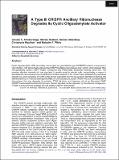A type III CRISPR ancillary ribonuclease degrades its cyclic oligoadenylate activator
Abstract
Cyclic oligoadenylate (cOA) secondary messengers are generated by type III CRISPR systems in response to viral infection. cOA allosterically activates the CRISPR ancillary ribonucleases Csx1/Csm6, which degrade RNA non-specifically using a HEPN (Higher Eukaryotes and Prokaryotes, Nucleotide binding) active site. This provides effective immunity but can also lead to growth arrest in infected cells, necessitating a means to deactivate the ribonuclease once viral infection has been cleared. In the crenarchaea, dedicated ring nucleases degrade cA4 (cOA consisting of 4 AMP units), but the equivalent enzyme has not been identified in bacteria. We demonstrate that, in Thermus thermophilus HB8, the uncharacterized protein TTHB144 is a cA4-activated HEPN ribonuclease that also degrades its activator. TTHB144 binds and degrades cA4 at an N-terminal CARF (CRISPR-associated Rossman fold) domain. The two activities can be separated by site-directed mutagenesis. TTHB144 is thus the first example of a self-limiting CRISPR ribonuclease.
Citation
Athukoralage , J S , Graham , S , Grüschow , S , Rouillon , C & White , M F 2019 , ' A type III CRISPR ancillary ribonuclease degrades its cyclic oligoadenylate activator ' , Journal of Molecular Biology , vol. 431 , no. 15 , pp. 2894-2899 . https://doi.org/10.1016/j.jmb.2019.04.041
Publication
Journal of Molecular Biology
Status
Peer reviewed
ISSN
0022-2836Type
Journal article
Description
This work was funded by a grant from the Biotechnology and Biological Sciences Research Council (Grant REF BB/S000313/1 to MFW).Collections
Items in the St Andrews Research Repository are protected by copyright, with all rights reserved, unless otherwise indicated.

